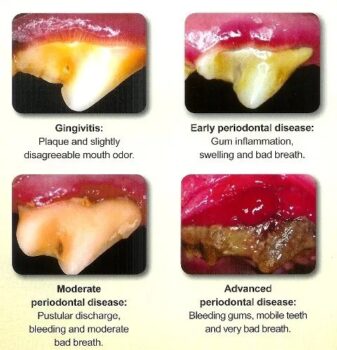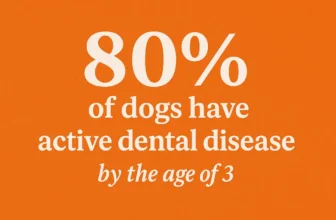The truth about dental dog foods

Like any sham industry, dental dog foods promise sparkling teeth and fresh breath, but are they just expensive kibbles with clever marketing?
Ask yourself this – Would your dentist prescribe processed food nuggets for you to keep your teeth clean?
Of course not, that would be silly, but that’s exactly what veterinarians prescribe for the dental health of our pets.
Let’s take a walk through the world of pet food marketing, addressing the simple facts which point you in the direction of better dental health for your dog.
“80% of dogs suffer active dental disease by the age of three”
Veterinarians witness dental disease in dogs and cats all the time, because it’s an epidemic.
I’ve discussed the seriousness of dental disease here, but in a nutshell it’s bad news for the long term health of your dog. Plaque and tartar build up, worsen, progress from dental disease to periodontal disease, and your dog’s immune system is forced to fight all the nasty bacteria travelling through their whole body.
But don’t worry, your veterinarian can clean those mucky teeth by putting your dog under anesthetic (which is not without risks), or sell you cleverly marketed dental treats and dental diets to somehow fix the problem.
But, do you think dental treats and dental diets fix the real problem?
Hill’s Prescription Diet t/d Dental Care Dry Dog Food
It’s likely your dog’s teeth have been going downhill thanks to their previous kibble, which makes attempting to fix the issue with another kibble an odd idea, don’t you think?
It’s likely your previous kibble was high in starch carbs which stick to the teeth, turn to sugars, and rot teeth.
Most kibbles are made of cereal grains, or if they’re grain free then other starches like tapioca or potato.
How is Hill’s Prescription Diet t/d Dental Care dry dog food the solution when the main ingredients are brewers rice and corn?
Aren’t dogs carnivores?
Ok, so there you were believing your dog was an omnivore, like us, when you only need to look at their teeth for a second to realise they’re nothing like us.
I hear the omnivore excuse often, and I can prove this is utter BS very simply, and factually, by telling you Hill’s Prescription Diet t/d Dental Care dry cat food has the very same main ingredients.
Cats definitely can’t be palmed off as omnivores, as they’ve very scientifically and factually carnivores, and shouldn’t be fed a diet of grains, and especially not as a dental diet to clean their poor teeth.
Does this have you questioning Hill’s Prescription Diet as the #1 recommendation by veterinarians to improve the dental health of your pet?
Royal Canin Dental “Expert” Dry Dog Food
As the second most recommended dental dog food, Mars brand Royal Canin Dental will set you back around 200 dollar-bucks for only 13 kilos, being made with rice, maize, and wheat gluten for your carnivorous pet.
Let’s reinforce the point I made earlier – What if your dentist told you to clean your teeth with such a food?
It’s crazy to think we trust these brands, and trust the recommendations of our veterinarians, when even at a basic level it makes very little sense.
Brushing your teeth with processed pellets isn’t the answer, is it?
We don’t clean our teeth with food.
We brush our teeth, usually twice a day, and we still struggle with dental hygiene.
Relying on a processed food (dry dog food is processed) for the dental health of our dogs is inefficient, and considering the ingredients of these dental diets also being inappropriate for the species (both cats and dogs), you also have to question what other health issues they may cause over the long term.
Do dental treats work?
If you’ve read the glaringly obvious reasons why dental diets are far from ideal for your facultative carnivore dog or obligate carnivore cat, then you probably know the answer this already.
Dental treats may contain some small additive which may reduce plaque and tartar build up, but the emphasis is always on the word may.
May can also be interpreted as may not, and it’s very clever marketing terminology.
Filling your petrol tank with milk may help your car run, but it probably won’t, and you have no comeback if you were sold the milk for that purpose and that’s what the milk seller advised.
“I said it may, but it was just a wildly construed assumption”
Pet treats fall under little to know regulation. Unlike “complete and balanced” dog foods which comply to pet food standards such as AAFCO, treats are mere gimmicks.
It is completely legal to sell a sticky treat made of wheat and humectants to make them soft and appealing, and sell them as treats for your carnivorous pet.
It’s also completely legal to say they may help with dental health, even if it’s very dubious whether it’s even possible.
Did you know the small print on most dental treats will tell you only the texture may help improve dental health?
Armed with this information, go and read the packets of Greenies, Whimzees, or Pedigree DentaStix – three of the most popular dental treats for dogs in Australia – and tell me what you find.
Did you know wild carnivores have impeccable dental health, and guess what – they don’t even brush their teeth!
I need to circle around to diet once again, because diet definitely matters.
Do you know what causes plaque and tartar to build up on our own teeth?
Starchy, sugary, carbs. We know very well sugary foods rot our teeth, and we live in a world where most foods we buy contain sugar – have you looked at the labels on supermarket foods and realised sugar is in most of them?
High carbohydrate foods turn to sugars, and can therefore stick to our teeth and rot our teeth.
Want some examples?
Wheat, rice, corn… the same ingredients used in dental diets for dogs and cats.
What an epic fail of a solution that is, but it’s easy to turn a blind eye if you’re a company who makes billions selling these diets.
Yes, billions.
How do wild carnivores keep their teeth clean without brushing, dental diets, or gimmicky dental treats?
The answer is simple – A diet as nature intended, and mechanical cleaning from eating the right diet.
For carnivores, like your dog and cat, that would be gnawing and chewing on whole prey, made naturally from protein, fat, and some fibre. Not starchy sticky carbohydrates from grains, tapioca, potato, or legumes.
When you consider all the simple and factual evidence above, which of the following statements makes sense to you:
[1] Processed pellets of cereal grains with some meat, combined with artificially softened and sweetened wheat-based treats will keep my dog’s teeth clean and breath fresh.
[2] Scraping off plaque and tartar from tearing flesh and gnawing on bone will scrape plaque and tartar from my dog’s teeth in a way designed by nature, and nature tends to know best.
Still don’t believe me?
Go and stick your head in the mouth of a lion, then come back and tell me how pristine the teeth were.
(Actually, please don’t)
Why real solutions matter for the health of your dog and cat
Going back to the “80% of dogs suffer active dental disease from the age of three”, that makes real solutions vital for the health of your pet.
I allured to chewing on flesh and gnawing on raw meaty bones above, but the simple solution is giving your dog (or cat) something to chew, to mechanically clean their teeth.
Want to know more? Continue to the solution by reading the article on dental disease, or skip to recommendation on what treats really work for dental health (when combined with a more appropriate diet).





